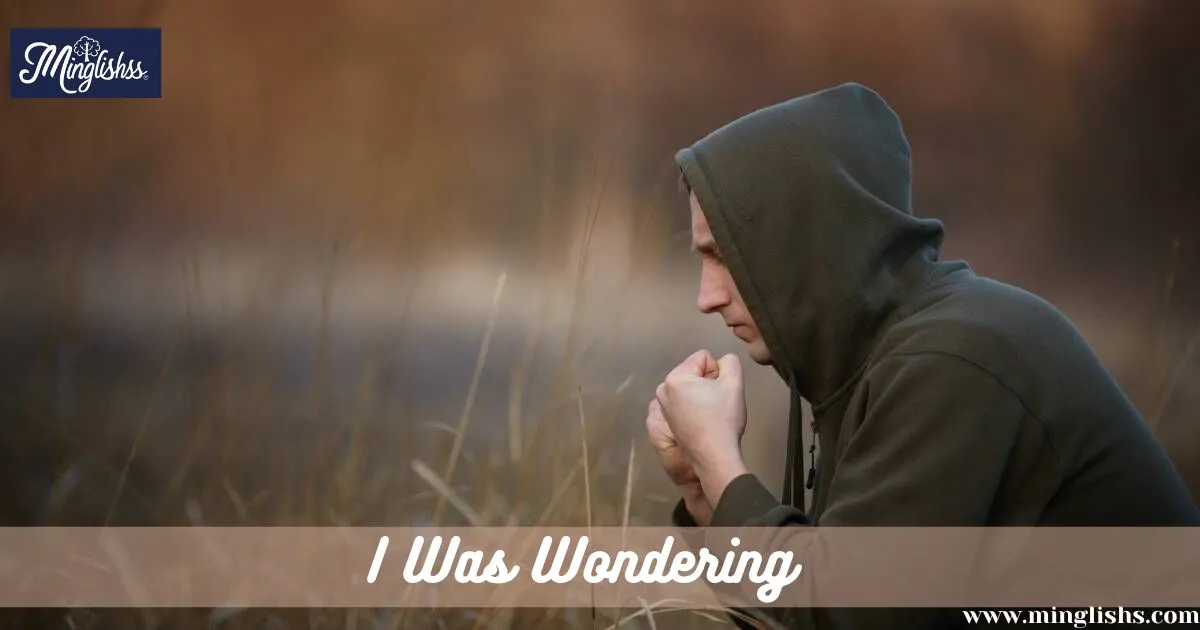“ Fresh phrases that express curiosity and engagement in conversation.”
Language is a powerful tool, and how we express our thoughts can significantly impact our interactions with others. One common phrase, “I was wondering,” is often used when we want to ask a question or share our thoughts. However, constantly repeating the same expression can make our conversations feel dull and monotonous. This blog explores various alternatives to “I was wondering,” helping you to sound more engaging and articulate in your communication.
Using varied phrases not only makes your speech more vibrant but also helps convey your curiosity in unique ways. It can also prevent you from sounding repetitive, allowing you to connect better with your audience or conversation partners. By learning different ways to express wonder, you will be better equipped to spark interesting dialogues, whether in casual chats with friends or professional discussions.
In this blog, we will discuss 35 different expressions that can replace “I was wondering.” Each phrase will be illustrated with a scenario and an explanation, along with additional tips to enhance your conversational skills. Whether you’re a student, a professional, or just someone who enjoys good conversation, these phrases will add richness to your language and help you express your thoughts more effectively.
Alternative Phrases and Their Usage
Here are 35 different phrases that can replace “I was wondering,” along with scenarios and explanations for each.
1. “I’m curious about…”

Scenario: Sarah is at a book club meeting discussing a new novel.
Subject Explanation: Sarah raises her hand and says, “I’m curious about the author’s inspiration for the main character.” This phrase invites others to share their thoughts and keeps the conversation flowing.
Additional Tip: When using this phrase, consider asking follow-up questions to deepen the discussion and show genuine interest in the topic.
2. “Have you ever thought about…”
Scenario: John is having coffee with a friend, talking about travel plans.
Subject Explanation: John casually says, “Have you ever thought about visiting Japan during cherry blossom season?” This invites his friend to reflect on travel experiences and preferences, leading to a lively exchange.
Additional Tip: Use this phrase to explore ideas and experiences, making it a great conversation starter.
3. “What do you think about…”

Scenario: Lisa and her colleagues are brainstorming for a new project.
Subject Explanation: Lisa asks, “What do you think about implementing a new marketing strategy?” This encourages everyone to share their insights and opinions on the topic at hand.
Additional Tip: This phrase is particularly effective in group settings, as it invites participation from multiple people.
4. “I’ve been pondering…”
Scenario: Mark is in a meeting discussing the company’s future.
Subject Explanation: Mark shares, “I’ve been pondering the idea of expanding our services to new markets.” This phrase communicates deep thought and invites others to consider the proposal seriously.
Additional Tip: Use this phrase when discussing more complex or profound topics to convey your serious interest.
5. “I’d like to know…”

Scenario: Emma is curious about a friend’s new job.
Subject Explanation: Emma says, “I’d like to know what you enjoy most about your new position.” This approach shows interest and encourages her friend to share personal experiences.
Additional Tip: This phrase can be paired with specific topics to make your question more targeted.
6. “Could you share your thoughts on…”
Scenario: Tom is interviewing a candidate for a job.
Subject Explanation: Tom asks, “Could you share your thoughts on teamwork in the workplace?” This expression makes the candidate feel valued and respected, encouraging a thoughtful response.
Additional Tip: This phrase works well in professional settings, demonstrating your interest in the other person’s expertise.
7. “I’m interested in…”

Scenario: Jessica is attending a seminar on environmental issues.
Subject Explanation: Jessica says, “I’m interested in learning more about sustainable practices.” This phrase conveys her eagerness to explore the topic further.
Additional Tip: Pair this phrase with a specific topic to direct the conversation and keep it focused.
8. “What’s your take on…”
Scenario: Kevin and his friends are debating the latest movie.
Subject Explanation: Kevin asks, “What’s your take on the ending of that film?” This phrase opens up a discussion, allowing friends to share differing opinions and insights.
Additional Tip: Use this phrase to encourage diverse viewpoints, making conversations more dynamic.
9. “I was thinking about…”
Scenario: Rachel is in a brainstorming session at work.
Subject Explanation: Rachel contributes, “I was thinking about a different approach to our marketing campaign.” This phrase indicates she has put thought into the topic, adding value to the discussion.
Additional Tip: This phrase can lead to innovative ideas, making it suitable for collaborative environments.
10. “Do you ever wonder…”
Scenario: Alex is talking with a group of friends about history.
Subject Explanation: Alex poses, “Do you ever wonder what life was like in ancient Rome?” This invites a captivating discussion about history and personal reflections.
Additional Tip: This phrase can spark curiosity and encourage imaginative thinking in conversations.
11. “Have you considered…”
Scenario: Julia is discussing fitness routines with her workout buddy.
Subject Explanation: Julia asks, “Have you considered trying yoga to complement your running?” This phrase encourages her friend to think about new options and enhances the dialogue.
Additional Tip: Use this phrase to introduce alternative suggestions in conversations, helping others expand their choices.
12. “I’m thinking about…”
Scenario: Mike is contemplating a career change during lunch with friends.
Subject Explanation: Mike shares, “I’m thinking about pursuing a degree in graphic design.” This expression opens the floor for support and advice from his friends.
Additional Tip: Sharing your thoughts can invite feedback and encouragement, enriching the conversation.
13. “I’d love to hear your opinion on…”
Scenario: Rachel is leading a discussion about a community project.
Subject Explanation: Rachel states, “I’d love to hear your opinion on the proposed park renovations.” This phrase encourages active participation and fosters collaboration.
Additional Tip: This expression works well in formal settings, signaling respect for others’ expertise.
14. “Can you help me understand…”
Scenario: Ethan is in a class discussing complex theories.
Subject Explanation: Ethan asks the teacher, “Can you help me understand this concept better?” This shows his willingness to learn and engage in the material.
Additional Tip: Use this phrase when you genuinely seek clarification, as it encourages supportive dialogue.
15. “What would you say if…”
Scenario: Olivia and her colleagues are brainstorming ideas for a presentation.
Subject Explanation: Olivia inquires, “What would you say if we included some case studies?” This approach invites creative thinking and collaboration among team members.
Additional Tip: This phrase can help visualize potential outcomes, enhancing brainstorming sessions.
16. “Could you elaborate on…”
Scenario: Liam is in a seminar on technology advancements.
Subject Explanation: Liam asks the speaker, “Could you elaborate on the impact of AI in our daily lives?” This phrase encourages deeper exploration of the topic, fostering rich discussions.
Additional Tip: Use this phrase to encourage speakers to share more insights, enhancing understanding.
17. “I’m eager to know…”
Scenario: Sophia is curious about a friend’s recent trip.
Subject Explanation: Sophia shares, “I’m eager to know about your experience in Italy!” This expression shows enthusiasm and opens the floor for her friend to share stories.
Additional Tip: This phrase communicates excitement, making conversations more engaging.
18. “What’s your perspective on…”
Scenario: Josh is having a discussion about political issues with a colleague.
Subject Explanation: Josh asks, “What’s your perspective on the recent policy changes?” This phrase allows for a nuanced discussion about different viewpoints.
Additional Tip: This phrase is great for complex discussions, as it shows respect for differing opinions.
19. “I’ve been thinking…”
Scenario: Mia is at a dinner party, sharing thoughts on art.
Subject Explanation: Mia comments, “I’ve been thinking about how art influences culture.” This phrase invites others to share their ideas and engage in meaningful dialogue.
Additional Tip: Use this phrase when you want to introduce a personal insight that can stimulate conversation.
20. “Do you think…”
Scenario: Noah is chatting with friends about upcoming events.
Subject Explanation: Noah asks, “Do you think we should attend the concert this weekend?” This phrase invites others to weigh in on decisions, encouraging collective input.
Additional Tip: This phrase is effective for group decisions, helping to foster teamwork.
21. “What if…”
Scenario: Emma is discussing project plans with her team.
Subject Explanation: Emma suggests, “What if we incorporated feedback from our clients?” This phrase encourages innovative thinking and collaboration among the team.
Additional Tip: Use this phrase to explore hypothetical situations, which can lead to creative solutions.
22. “Have you heard about…”
Scenario: Sam is talking to a friend about recent news.
Subject Explanation: Sam asks, “Have you heard about the new restaurant opening downtown?” This phrase invites discussion about shared interests and experiences.
Additional Tip: This phrase can serve as a great icebreaker, sparking conversations about current events.
23. “What’s your experience with…”
Scenario: Rachel is talking to a mentor about career choices.
Subject Explanation: Rachel asks, “What’s your experience with transitioning to a new field?” This shows respect for her mentor’s insights while inviting valuable advice.
Additional Tip: This phrase can help build rapport and deepen connections with others.
24. “I’m intrigued by…”
Scenario: Alex is attending a lecture on space exploration.
Subject Explanation: Alex expresses, “I’m intrigued by the potential of colonizing Mars.” This statement opens the floor for others to share their views on this exciting topic.
Additional Tip: Use this phrase to convey enthusiasm about specific topics, encouraging lively discussions.
Other Ways to Say “I Am Praying for You”
25. “I find it interesting that…”
Scenario: Lucy is at a networking event discussing industry trends.
Subject Explanation: Lucy says, “I find it interesting that remote work is becoming more popular.” This observation can spark discussions about the future of work.
Additional Tip: This phrase is effective in professional settings, as it shows you are informed and engaged.
26. “I wonder if…”
Scenario: James is contemplating a new business idea.
Subject Explanation: James muses, “I wonder if we could create a subscription service for eco-friendly products.” This phrase invites others to share their thoughts on the idea.
Additional Tip: Use this phrase to introduce possibilities that can lead to innovative discussions.
27. “What do you feel about…”
Scenario: Maya is discussing a book with her club.
Subject Explanation: Maya asks, “What do you feel about the ending of this story?” This question encourages emotional responses and deeper analysis of the material.
Additional Tip: This phrase encourages personal reflections, making discussions more heartfelt.
28. “Could you shed some light on…”
Scenario: Ethan is in a training session and seeks clarification.
Subject Explanation: Ethan asks, “Could you shed some light on the new software features?” This request invites detailed explanations and insights from the trainer.
Additional Tip: This phrase can help clarify complex topics, ensuring better understanding.
29. “I’m hoping to learn about…”
Scenario: Claire is at a workshop on nutrition.
Subject Explanation: Claire shares, “I’m hoping to learn about meal planning strategies.” This expresses her eagerness to gain knowledge and encourages the instructor to provide useful tips.
Additional Tip: This phrase works well in educational settings, showing your commitment to learning.
30. “Would you mind sharing…”
Scenario: Tom is catching up with an old friend.
Subject Explanation: Tom asks, “Would you mind sharing what you’ve been up to lately?” This approach shows interest in his friend’s life and experiences.
Additional Tip: This phrase is polite and respectful, making it suitable for various social situations.
31. “Can you explain…”
Scenario: Jennifer is in a seminar on digital marketing.
Subject Explanation: Jennifer inquires, “Can you explain how SEO affects website traffic?” This question invites detailed information and insights from the speaker.
Additional Tip: Use this phrase when you need clarification or deeper understanding of a topic.
32. “I find it puzzling that…”
Scenario: Mark is discussing a recent scientific discovery with peers.
Subject Explanation: Mark states, “I find it puzzling that we still don’t have all the answers about climate change.” This statement encourages critical thinking and discussion about ongoing issues.
Additional Tip: This phrase can help initiate discussions around complex topics that require thoughtful analysis.
33. “I’d appreciate your insights on…”
Scenario: Rachel is seeking advice on career development.
Subject Explanation: Rachel says, “I’d appreciate your insights on how to negotiate a salary raise.” This expresses respect for others’ experiences while seeking guidance.
Additional Tip: This phrase demonstrates humility and encourages others to share their expertise.
34. “Is it possible that…”
Scenario: Kevin is discussing theories about the universe with a group.
Subject Explanation: Kevin asks, “Is it possible that there are other dimensions we haven’t discovered?” This phrase opens the floor for speculative discussions and theories.
Additional Tip: Use this phrase to explore abstract concepts, encouraging imaginative thinking.
35. “What are your thoughts on…”
Scenario: Emma is chatting with her friends about environmental initiatives.
Subject Explanation: Emma asks, “What are your thoughts on the new recycling program in our city?” This expression encourages her friends to share their opinions, leading to a vibrant discussion.
Additional Tip: This phrase helps create a collaborative environment, making it easier for others to share their views.
Pros and Cons
Pros:
- Variety in Communication: Using different phrases makes conversations more interesting and engaging.
- Encourages Participation: Varied expressions can invite others to share their thoughts, fostering more dynamic discussions.
- Conveys Interest: Unique phrases can show genuine curiosity and interest in others’ perspectives, enhancing relationships.
Cons:
- Overcomplicating Conversations: In some situations, simpler phrases may be more effective and relatable.
- Misinterpretation: Some phrases might not be well understood by everyone, leading to confusion.
- Context Dependency: Certain expressions may not fit all contexts, so choosing the right one is essential.
Answers To Key Questions “I Was Wondering”
1. Why should I use alternatives to “I was wondering”?
Using alternatives can make your conversations more engaging and diverse, encouraging others to participate and share their thoughts more openly.
2. Are there specific contexts where certain phrases work better?
Yes, different phrases may suit different situations. For example, “I’m hoping to learn about…” is more appropriate in educational settings, while “What do you feel about…” might be better for casual discussions.
3. How can I incorporate these phrases into my daily conversations?
Practice using these phrases in your everyday interactions. Start by replacing “I was wondering” in your questions with the alternatives that feel most comfortable to you.
4. What are some tips for improving my conversational skills?
Listen actively, ask open-ended questions, and be genuinely interested in others’ responses. Using varied phrases can also help keep the conversation flowing.
5. Can using varied phrases enhance my professional communication?
Absolutely! Diverse expressions can showcase your communication skills and make you appear more engaged and approachable in professional settings.
Conclusion
Finding alternative phrases to express curiosity and engagement in conversation can greatly enhance communication skills. By using varied expressions, you can make your dialogues more engaging, invite deeper discussions, and demonstrate your genuine interest in what others have to say. From “I’m curious about” to “What’s your take on,” these alternatives offer fresh ways to approach conversations.
Incorporating these phrases into your vocabulary not only enriches your speech but also helps foster meaningful connections with others. Remember, effective communication is not just about asking questions but also about encouraging others to share their insights. So, the next time you feel like saying, “I was wondering,” consider choosing one of these alternatives to elevate your conversation.

Hi, I’m Ethan Matthews: I make English easy with my clear and simple teaching style. I love helping learners feel confident in every lesson.










